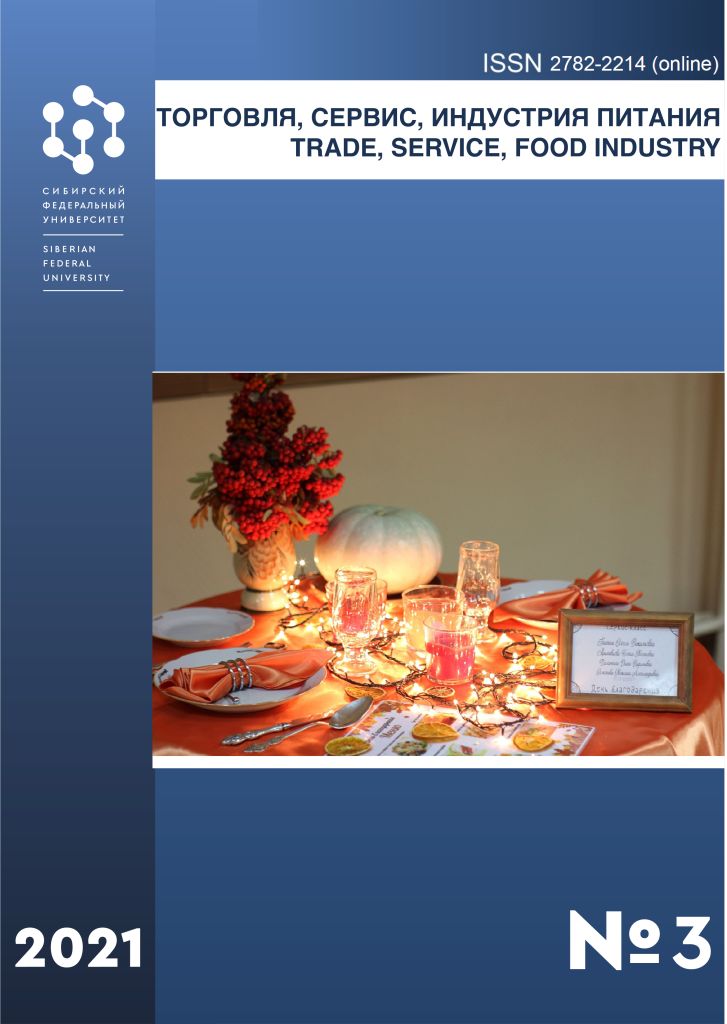Krasnoyarsk, Krasnoyarsk, Russian Federation
UDC 33
CSCSTI 06.56
The variety of models of conducting economic relations in the last few decades has led to the fact that the most pronounced manifestation and action of those whose competitive foundations allow them to hold current positions or occupy new niches occurs in the market of goods and services. In the article, the author attempts to analyze and compare the characteristics of several models of economic relations: breakthrough innovations, business ecosystems. The model of breakthrough innovations was introduced into scientific circulation by K. Christensen, which is based on changes in values in any market [21]. As noted in the report of the Bank of Russia, in the second quarter of 2021, the market is developing due to the digitalization of the consumer segment and the activity of large online companies [15]. This trend is formed due to the transition of part of economic relations to the real-time mode using digital formats for their implementation, which are based on a certain concept of carrying out activities. In this regard, the study of various business models becomes relevant with the help of an integrated approach that takes into account the diverse development of economic relations.
act of purchase and sale, business ecosystems, breakthrough innovations, consumer behavior, goods, services, digitalization of economic relations, digital platforms
1. National program "Digital Economy of the Russian Federation: passport of the national project approved by the Presidium of the Presidential Council for Strategic Development and National Projects of 04.06.2019 No. 7 // Reference legal system "ConsultantPlus". - Access mode: http://www.consultant.ru/document/cons_doc_LAW_319432/ (Accessed: 19.09.2021)
2. Ananina, R. F., Kuimov, V. V., Simonov, K. V., Kobalinsky M. V. (2021). Business ecosystems of the region: development opportunities in the digital space. Creative Economy. 15(2). 359-378.
3. Ananina, R. F. (2021). The significance of breakthrough innovations in the economy of shared consumption/ In: Regional consumer goods markets: quality, environmental friendliness, business responsibility: collection of materials in the III All-Russian Scientific and Practical Conference with international participation, December 10-11, 2020 / ed. for the issue of Yu. Yu. Suslova. Krasnoyarsk: Sib. feder. un-t. 568-572.
4. Ananina, R. F., Kuimov, V. V. (2017). Evaluation of cooperative-network interactions through a system approach. Russian Entrepreneurship. 18(24). 2053-2062.
5. Vladimirova, O. N., Malakhovskaya, M. V., Petrova, A. T., Khusainov, M. K. (2017). Innovativeness as a factor of growth of the economy of the service sector: measurement and influence of the territorial aspect. Moscow. Creative Economy. 212 p.
6. Gorshenin, V. F. Rakhmatullina, V. R. (2018). Digital transformation of procurement logistics. In: Society, economics, management. Chelyabinsk. 40-45.
7. Dokuchaeva, S. M. (2020). Trends in the development of innovation policy of IT infrastructure in the digital economy. In: Risk: resources, information, supply, competition. 2. 50-52.
8. Dolgova, M. V., Dryazgina, E. S. (2015). The economy of joint consumption as a new business model. In: Finance, money, investment. 3(55). 13-18.
9. Kislyakov, A. S. Ishchenko, A.D. (2019). The influence of the IV Industrial Revolution on the ecosystem economy and its impact on consumer trends. In: Power. 27(4). 110-116.
10. Kuimov, V. V. (2019). Economics of cooperative-network interactions. Theory. Practice. Opportunities. Moscow. INFRA-M. 200 p.
11. Kuimov, V. V., Suslova, Yu. Yu., Shcherbenko, E. V. (2016) Regional technological platforms as an instrument of innovative development of the territory: monograph. Moscow. INFRA-M. 344 p.
12. Lichtenstein, V. E. Konyavsky, V. A., Ross, Sh. V. (2018). Multi-agent systems: self-organization and development. Moscow. Finance and Statistics. 262 p.
13. Assessment of the openness of state information systems in Russia [Electronic resource]. Analytical report. - Access mode: https://roskazna.gov.ru/upload/iblock/534/otsenka-otkrytosti-gosudarstvennykh-informatsionnykh-sistem-v-rossii.pdf (Accessed 19.09.2021)
14. Parker, J. et al. (2017). Platform Revolution. How network markets change the economy - and how to make them work for you. 352 p.
15. Trends of the microfinance market in the second quarter of 2021 [Electronic resource] / Report of the Bank of Russia. - Access mode: https://cbr.ru/Collection/Collection/File/35573/mmt_2021_2. pdf (Accessed: 19.09.2021)
16. Petersma, P. (2019). Key management models. 77 models that every manager should know. 400 p.
17. Digital horizons: the ecosystem of IT entrepreneurship and startups in Russia [Electronic resources] / Association of Electronic Communications-RAEC. - Access mode: https://raec.ru/upload/files/oc-c-raec.pdf (Accessed: 19.09.2021)
18. Digital platforms - the new market power [Electronic resource] / V. Mesropyan. - Access mode: https://www.econ.msu.ru/sys/raw.php?o=46781&p=attachment (Accessed: 19.09.2021).
19. Barnes, J. A. (1954). Class and committees in a Norwegian Island parish. In; Human Relations. 7. 39-58.
20. Botsman, R., Rogers, R. (2010). What’s mine is yours: The rise of collaborative consumption. New York: Harper.Collins. 304 p.
21. Bowyer, J. L., Christensen, C.M. (1995). Disruptive technologies: catching the wave. In: Harvard Business Review. 73(1). 43-53.
22. Constantiou, I., Marton, A., & Tuunainen, V. K. (2017). Four Models of Sharing Economy Platforms. M I S Quarterly Executive. 16(4). 231-251.
23. Hamari, J., Sjöklint. M., Ukkonen, A. (2016). The Sharing Economy: Why People Participate in Collaborative Consumption. In: Journal of the Association for Information Science and Technology. 67. 2047-2059.
24. Jiangli, D., Bing, Y. (2019). Versioning goods and joint purchases with network externality. In: Prague Economic Papers., 28(4). 433-448.
25. Zervas, G., Proserpio, D., Byers, W. (2017). The Rise of the Sharing Economy: Estimating the Impact of Airbnb on the Hotel Industry. In: Journal of Marketing Research. 5. 687-705.








